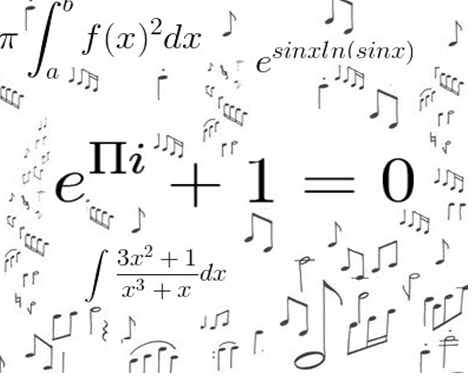|
In recent years, we’ve been hearing a lot about the “Mozart Effect” and other studies that have shown how studying music increases our ability to learn and retain information. But what is the exact relationship between math and music, and how does learning music help us learn math? Well, it’s complicated… We most often associate math with the rhythmical aspect of music. We have to know what 2+2 equals in order to count half notes, and we have to know how many counts each measure gets in order to play a piece correctly. So just by learning to read and play music, we’re simultaneously increasing our ability to perform mathematical equations as they mirror what we’re learning in rhythmic notations. But…do we learn math better because we’re musicians? Not necessarily. Recent studies conducted by the Laboratories of Cognitive Neuroscience at Boston Children's Hospital have shown that studying a musical instrument causes changes in the brain in the motor and auditory cortices mainly; "Auditory, because you're using your ears a lot … and then motor because you're doing a lot of practice with your fingers and arms requiring unique movements.” Lead investigator Nadine Gaab also said that these results show that people who play instruments have better coordination and listening skills than non-musicians, but they do not tell us if one played an instrument better because they were good at math, or that they were good at math because they knew how to read and play music. So what exactly is the connection between math and music? The closest connection between math and music is patterns. Markus J. Buehler wrote “Essentially, music is just one example of a hierarchical system, where patterns are nested within larger patterns—similar to the way characters form words, which form sentences, then chapters and eventually a novel.” Math can be understood as different sequences of numbers that make up certain patterns. Music can be understood as different sequences of notes that make up certain patterns. Both music and math follow specific rules and processes for understanding the patterns, such as equations or time signatures. Understanding patterns in math helps us to know how to build things, how to plant gardens, or how to plan our finances for example; while understanding patterns in music help us know how to play different rhythms and time signatures, know how many measures a piece has, and even compose our own music. Recognizing patterns in both math and music is a problem solving skill. As we learn to understand all of the different patterns and increase our analytical skills, we can carry over those over into other areas of our lives and start to use more abstract approaches to problem solving and on a larger scale. We are able to start connecting different sequences and patterns together to make a bigger picture. So what is the answer? While we can’t definitively say that studying music makes us better at math, we can conclude that since patterns are the main structures for numbers and notes, and that we learn how to recognize and understand patterns through studying music, we’re subconsciously performing mathematical functions at the same time we’re playing music. The more we improve in our musical abilities, the more we improve our problem solving skills whether we use them towards actual mathematical applications or as architectural plans that help build different areas of our lives. ________________________________________________________________________________________________________________________ Stay Connected to LessonsOnTheWeb and Learn Much More! LessonsOnTheWeb Academy: High Quality Music Classes LessonsOnTheWeb Official Twitter: @LessonsOnTheWeb LessonsOnTheWeb Official Facebook: Free Videos, and Offers
bffs
10/17/2019 05:20:15 pm
soooooo do you know how to spell piano with music notes
Reply
5/18/2021 03:32:43 pm
You did a great explanation. We particularly need a creative mind in science. It isn't all mathematics, nor all rationale, however, it is to some degree lovely and verse.
Reply
Leave a Reply. |
AuthorMost blogs written by Archives
June 2020
Categories
All
|


 RSS Feed
RSS Feed